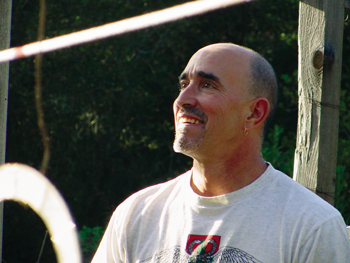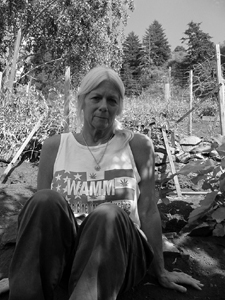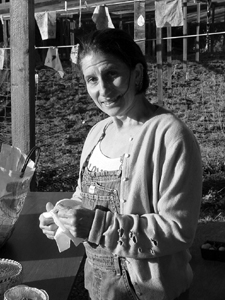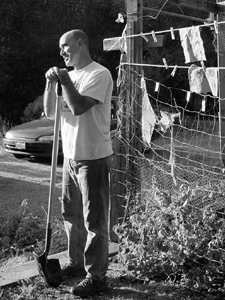![[Metroactive Features]](/gifs/feat468.gif)
[ Features Index | Santa Cruz | Metroactive Home | Archives ]
Looking to the Future: WAMM co-founder Michael Corral says recent DEA crackdowns on medical marijuana are stirring public outrage.
Green Milestones
Six months after the DEA raided their land and left the threat of incarceration and forfeiture hanging over their heads, medical marijuana activists Valerie and Michael Corral are making plans for the future
By Sarah Phelan
It's not easy to find the way to WAMM's garden. First, someone has to tell you where it is--and for them to tell you where it is, you have to earn that someone's trust. Then you have to climb a long and winding road. And when you finally round the last bend in this rite of passage, you don't even get the skunky scent of marijuana to let you know that you've arrived.
At least not in February, and probably not for a while, given that the Wo/Men's Alliance of Medical Marijuana, which lost its last marijuana crop in a predawn DEA raid last fall, is not planning to grow any flavor of cannabis, at least not this year.
Which is not to say that WAMM won't be cultivating other crops--and other projects.
At a time when groundhogs back East are typically checking their shadows, I find group co-founder Valerie Corral making prayer flags with the help of a new WAMM crop that's doubtless a groundhog favorite--the lowly potato.
"You cut the potato in half, carve a pattern in it, smear it with paint and stamp it onto one of these cloth squares," Corral explains, as she stamps tangerine squares with a lime-green fish pattern.
Nearby, Corral's husband and WAMM co-founder Michael Corral turns the former marijuana plot with a spade and unearths ... more potatoes.
"It's still a bit early to plant," says Michael, retrieving a moist, earthy-smelling spud, "but we're preparing the ground to grow vegetables and fruits."
Watching her stamp and him dig, surrounded by a dozen WAMM members, many of whom are sick and dying, it's hard to believe that a federal court could deem this couple to be felons and seize their property, including this solace-bringing garden, for doing nothing more than implementing Prop. 215, the state's medical marijuana legislation, which California voters passed in 1996.
But clearly the will of California voters and the federal law of the land (as interpreted by federal drug czar John Walters) are not on the same page these days--as the Corrals found out last fall, when semiautomatic-toting DEA agents arrested them in a raid that reduced their marijuana plants to stumps and left the threat of incarceration and asset forfeiture hanging over their heads.
"It makes me want to cry, what's happened, but everyone is taking it so well," says WAMM member Don Ivey, as fellow WAMMster Jean Hanamoto pegs prayer flag squares to dry and her husband George, one of WAMM's lead gardeners, discusses vegetable and flower planting with Michael.
"Anyone want to watch the videotape on Ed Rosenthal?" interrupts a voice from a nearby work shed, and next thing you know everybody crowds inside the shed, which currently houses a sewing machine for prayer flag manufacture, a VCR--and a security camera.
The Rosenthal Debacle
The last time I watched a videotape in this shed was shortly after the DEA raid, as WAMMsters reviewed footage (captured on said security camera) of chain-saw-wielding DEA agents mowing down 160 marijuana plants that moments before stood 6 to 8 feet tall and were only moments away from being harvested.
That video triggered a whole lot of anger, frustration and tears, and had several WAMMsters shouting, "The DEA are the terrorists!"--a comment that was all the more poignant, given that the DEA raid happened six days before the first anniversary of the Sept. 11 attacks.
Today, the atmosphere is lighter, though this video is equally heavy, since it deals with Ed Rosenthal, a 58-year-old family man, gardener, and bestselling author, whom a federal court recently deemed a triple felon for growing medical marijuana for the city of Oakland--an activity authorized not only in California, but also in Alaska, Arizona, Colorado, Hawaii, Maine, Oregon and Washington.
"Everyone agrees not to talk?" says Michael Corral, and we watch in silence as jurors who found Rosenthal guilty now say they feel guilty.
"This man is no criminal. He's a hero to thousands of people," says one juror, recalling how she wasn't allowed to hear the words "medical marijuana" in court, and only later learned that Rosenthal, whom the feds portrayed as a drug kingpin in court, was growing weed with the state's blessing to help people with AIDs, glaucoma, and cancer.
Much like the Corrals, Rosenthal was busted in a predawn raid. But unlike Michael and Valerie, who have yet to be formally charged, Rosenthal, who writes the Ask Ed column for High Times, has been sentenced to a minimum of five years in jail.
All of which helps explain this bizarre videotape in which jurors apologize to Rosenthal for a "travesty of justice," federal drug czars accuse California of "thumbing its nose at the feds" and California's Attorney General Bill Lockyer predicts a sharpening of conflict between states' rights and federal law.
But while some might see the case of Ed Rosenthal as a bad omen for medical marijuana growers, the Corrals take it as a hopeful sign, because of the public outrage it has stirred.
"We feel that people nationwide are saying that arresting medical marijuana providers is stupid. And I think public outrage is what it'll take, because I don't think the democratic process is strong enough for this administration," says Valerie, after the video ends.
"One of the most important things we've learned from all this is to do what we're doing and not live in fear. A myriad of things could happen, a couple of them very threatening, but this could also force the recognition of medical marijuana by the federal government."
Michael nods. "The trial of Ed Rosenthal awakened the judicial awareness of a lot of people, because once the jury found out what was going on, that they'd been kept in the dark about him growing it for medicinal purposes, they were outraged."
"We are the DEA's worst nightmare," adds Valerie, who has maintained scrupulous records and respectful relationships with elected officials and law enforcement officers at local and state levels.
And while they'd rather be growing and providing medicine along with emotional support to the members of their cooperative, the Corrals say they're prepared to go to jail.
"This is not really about marijuana, but about civil liberties, freedom and truth, and we'd go to jail not only believing but having experienced something to substantiate those claims," says Valerie, who discovered marijuana's healing powers firsthand after a car accident left her with epileptic seizures.
Michael agrees. "The 'criminal' part is OK, because we could win that round, but the asset forfeiture is the hardest. It threatens everything we've done for almost 30 years."
Prayer for the Dying
Though they could spend years dwelling on worst-case scenarios, the Corrals have opted to make prayer flags, plant another garden and open a hospice--activities which, they say, help them feel like they are building while they figure out how to make the medicine without losing their land, a threat which will dog them for the next five years.
"We're still doing what we would do, it's not just about pot," says Valerie, noting that since the raid, 31 WAMM members have died, five within a single span of 11 days.
"I believe that the DEA's raid has led to these members meeting their graves sooner and with more distress," she says, "in part because of tremendous stress and worry, and in part because of a reduction in the amount of marijuana available."
And since WAMM is a club whose members are literally dying to get in--many have cancer and AIDs-- it seems only logical for the Corrals to open a hospice, thereby putting into practice all the lessons about death that their members and others have taught them in the decade since WAMM was founded.
"Often people have that Grim Reaper impression of death, a lot of darkness about what's unknown, laced with fear, but when people have the opportunity to be met with grace of love and gentleness, often they embrace death and take it as a lover, and so begin a courtship that changes them profoundly, and allows them to seek death, instead of running from it, and to see that nothing is more important than that moment," says Valerie.
Michael nods. "Ours is human response to suffering, while the federal government fails to provide universal health care," he says.
"And if you think about the Supreme Court, all the Republican cronies, all the corporate attorneys all placed there by other corporate attorneys and the CIA and Nixon, who was placed there by the pharmaceutical industry, it's insidious, a serpent eating its tail as the American public and the rest of the world are squeezed," interjects Valerie.
"The administration gives us the message that 'Your peace marches don't matter' as they try to make a unilateral decision that affects the whole world." She shakes her head in disgust. "Great change does not come about without personal risk. You have to be willing to lose something, and what we're holding in terms of land and property has no great value in the face of loss of freedom."
For all their criticisms of the current administration, the Corrals both warn that we cannot only blame our federal government.
"We are responsible, we must act, we must be willing to risk," says Valerie. "Do we know that we risk a lot? Yes, but we don't focus on that. Prison and forfeiture of our property are just two possibilities. And though Bush and his cronies sit in their bunkers, there is no safety--illness is not partisan, and suffering is human."
"And just because you have money to buy yourself better care doesn't make you more comfortable and less afraid of death," says Michael. "We have to personally prepare for our own deaths and to prepare the world for the coming generations. We cannot forget either of those. If we do, we make it a less pleasant place to live in. And the idea of prohibition within a supposed free society is a contradiction in terms."
Legalspeak
This month Congressmember Sam Farr, along with California Reps Lynn Woolsey and Dana Rohrbacher, will introduce legislation that creates two legal categories of marijuana--medical and criminal.
Farr, who authored this bipartisan legislation, says "it will allow individuals who can prove they possess or cultivate their product for medical use only to use that fact as a valid defense in a federal trial."
For, as the Rosenthal case so vividly illustrates, federal judges currently instruct juries to disregard any claim of justified growth and distribution of marijuana, even if it occurs in any of the eight states with medical marijuana statutes, a situation that leaves growers like the Corrals subject to raid, arrest, prosecution and forfeiture.
"The DEA and the Justice Department, both led by Attorney General John Ashcroft, have no respect for the laws that we here in California have established to allow patients to live pain-free lives," said Farr in a recent press release. "The purpose of this bill is to allow defendants in federal criminal trials to introduce evidence that their marijuana-related activity was performed for a valid medical purpose under state law. If a jury finds that a defendant was following state medical marijuana law, then the defendant should not be sent to prison. It's as simple as that."
Asked what they think of Farr's efforts, Valerie says, "It's particularly helpful in the wake of Rosenthal. Of course, we don't want to be arrested in the first place, but our main stumbling block in court is not being able to say the words 'medical marijuana,' so Farr's legislation is the first brick."
Michael agrees. "I have to congratulate Sam for taking that step. If we're not able to say 'medical,' they'll convict us. Will they still be able to take our property? Yes. So, we're not able to resolve suffering through one small step. We've still got 'Farr' to go."
Locally, the Corrals' legal defense team, which includes Gerald Uelman and Ben Rice, has got the county to join as a plaintiff in a lawsuit they're filing March 24, and they're also appealing the denial of their motion for a return of the pot and other property, including a computer, that was seized in the Sept. 5 raid.
"In his denial of our first motion, the judge made it clear that he was inviting us to file an appeal, and if the Corrals face criminal charges, I'm coordinating that effort,' says Rice. "Bunches of lawyers have agreed to work on this case pro bono."
Asked about the Rosenthal case, Rice says, "The part that was alarming to us was that a San Francisco jury would convict Ed. We were concerned that this would embolden the feds to come after Valerie and Michael, since the feds would have an easier time convincing a San Jose-based jury of their guilt. The flip side is that with so much outrage around that verdict, maybe it's even better for the Corrals. The more people look at this issue, the better."
As for the Corrals, they believe the war on medical marijuana is all about economics and control.
"And, I should also add in, fear on the part of the government. All governments are afraid of the people," says Michael.
And Valerie adds that she'd like to see states' rights to medical marijuana respected, access increased through rescheduling marijuana as a second class drug, and each person allowed to grow the green stuff individually.
"Otherwise, you find yourself at the whim of pharmaceutical companies and HMOs. And I don't want to hear that the feds are concerned for my health, because if they were, they'd provide us all with health insurance."
Adds Michael, "What's really necessary here is the face of patience, because there is a real need for medical marijuana. People focus on the Rosenthal trial. And I say, great, but really what this is about is that people are sick and dying. Everything always gets down to people. So, it's important that more and more people be in the peace marches, and write their reps about the war and medical marijuana, and whatever, and at least vote--and turn off Fox News and read a book instead."
[ Santa Cruz | Metroactive Central | Archives ]
Copyright © Metro Publishing Inc. Maintained by Boulevards New Media.
![]()

Photographs by Sarah Phelan

Field of Dreams: Susan Durst sits against the backdrop of WAMM's garden.

Homegrown Movement: 'We are the DEA's worst nightmare,' says WAMM co-founder Valerie Corral.

Ace of Spades: Corral with his garden's new prayer flags.
A comedy show benefiting WAMM will be held at Moe's Alley, Sunday, March 16 at 8pm; tickets are $10.
From the March 12-19, 2003 issue of Metro Santa Cruz.